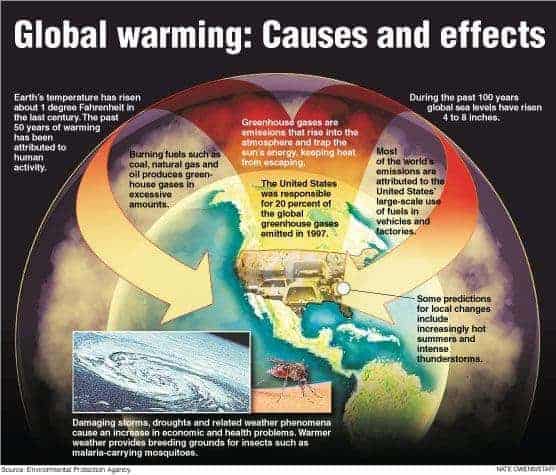“We are not faced with two separate crises, one environmental and the other social, but rather one complex crisis which is both social and environmental. Strategies for a solution demand an integrated approach to combating poverty, restoring dignity to the underprivileged, and at the same time protecting nature.” — Pope Francis, “Laudato Si: On Care for our Common Home,” June 18, 2015
Donald Trump believes climate change is a myth created to handicap the U.S. economy and stifle growth in manufacturing. If you don’t believe me, check the public record–his tweets.
According to one analysis of his personal Twitter feed, since 2011 Trump has authored more than 100 tweets affirming his belief that man-made climate change is a hoax, including one in 2013 where he wrote, “Give me clean, beautiful and healthy air – not the same old climate change (global warming) bull—! I am tired of hearing this nonsense.” As a candidate, Trump repeatedly promised that as president one of his first priorities would be to withdraw from the Paris Accord, an international climate change agreement, and “stop all payments of U.S. tax dollars to U.N. global warming programs.”
It should come as no surprise then that Trump made good on his base and fossil fuel industry-pleasing promise, removing the United States from the agreement between 195 nations to reduce greenhouse gas emissions and curb rising global temperatures; abdicating our nation from its position of global leadership on climate change and renewable energy, all while betraying and jeopardizing our planet, our country and its communities of color that disproportionately bear the brunt of climate change and environmental racism.
The Environmental Protection Agency has found that the groups most vulnerable to the effects of climate change are urban residents and the poor. African Americans, Hispanics, and Asian Americans are especially vulnerable to air pollution. A Natural Resources Defense Council report found that 68 percent of Black people live within 30 miles of a coal-fired power plant. African Americans and Hispanics–who are 165 percent more likely to live in a polluted community–suffer from disproportionate rates of asthma. One in six African-American children have asthma–a condition that is more likely to be fatal for people of color. According to the American Lung Association, Black Americans suffer from lung cancer more than any other group in the United States. In 2007, an estimated 46 percent of people of color lived three kilometers away from a hazardous waste facility.
Reporting has also found that Black people are two times more likely to die in a heat wave than white Americans and Hispanic Americans–who predominately live in states prone to drought, extreme heat, air pollution and flooding, and are overrepresented in the crop and livestock industry–are three times more likely to die from excessive heat.
While we worry about melting ice caps in the Antarctic, we donate bottled drinking water to Flint. Lead contamination in our drinking water has trickled beyond the limits of the city that has come to exemplify the tragic consequences of obsolete lead regulations and lax water safety testing practices. It is estimated that more than 30 cities across our nation are dealing with dangerous lead levels in its water and its effects, including impaired development and behavioral problems in children. Experts believe rising sea levels exacerbated the fatal consequences of Hurricane Katrina. The storm, one of the deadliest hurricanes in our history, caused an estimated $100 billion in damage and is said to have taken 1,800 lives, decimating Black communities– many of which were not rebuilt after the storm.
Climate change is a pressing issue that needs to be addressed for our planet, our nation and its most vulnerable people, and considering the outsized impact of climate change on communities of color, those strategies must connect climate change and racial justice in order to succeed for the most people. Where the president sees burdensome costs and job loss, the National Urban League sees clean energy opportunities–and gainful employment.
In the 2017 State of Black America, Donald Cravins, Jr., who serves as the National Urban League’s Senior Vice President for Policy, outlined the expansive economic opportunities in the American energy industry in an article titled, “Can the Energy Industry Solve Persistent African-American Unemployment?” He argues that there are millions of jobs in the sector. Fossil-fuel employees can be retrained, and communities that suffer from high numbers of unemployment can find new opportunities for work that doesn’t destroy our economy or our environment.
Trump’s withdrawal from the climate accord reflects a belief that climate change is not a pressing national issue and does not deserve to be seen and treated as a national priority. Fortunately, most Americans don’t feel the same. Hours after announcing the withdrawal, cities, states, corporations and private citizens across our nation pledged to continue to fight for our environment and for environmental justice–because there is no time to waste on either front.
Marc H. Morial is President and CEO of the National Urban League. He was a Louisiana State Senator from 1992-1994, and served as mayor of New Orleans from 1994 to 2002. Morial is an Executive Committee member of the Leadership Conference on Civil Rights, the Black Leadership Forum and Leadership, and is a Board Member of both the Muhammad Ali Center and the New Jersey Performing Arts Center.



